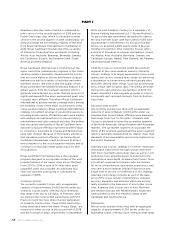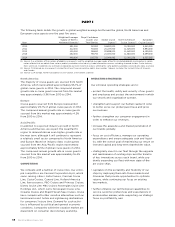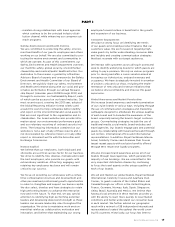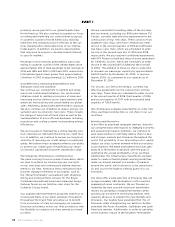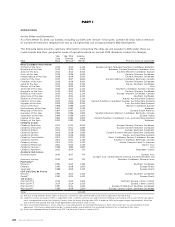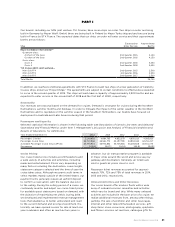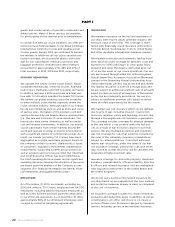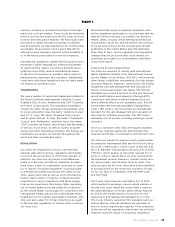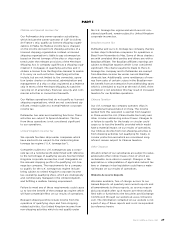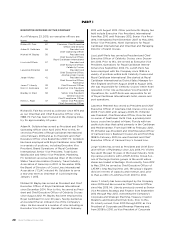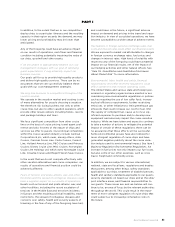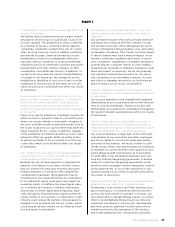Royal Caribbean Cruise Lines 2014 Annual Report Download - page 25
Download and view the complete annual report
Please find page 25 of the 2014 Royal Caribbean Cruise Lines annual report below. You can navigate through the pages in the report by either clicking on the pages listed below, or by using the keyword search tool below to find specific information within the annual report.
24 Royal Caribbean Cruises Ltd.
PART I
issued by the U.S. Coast Guard in January 2015, we
do not expect any material costs due to implementing
these regulations.
Environmental Regulations
We are subject to various international and national
laws and regulations relating to environmental protec-
tion. Under such laws and regulations, we are gener-
ally prohibited from discharging materials other than
food waste into the waterways. We have made, and
will continue to make, capital and other expenditures
to comply with environmental laws and regulations.
From time to time, environmental and other regulators
consider more stringent regulations, which may affect
our operations and increase our compliance costs. We
believe that the impact of ships on the global environ-
ment will continue to be an area of focus by the rele-
vant authorities throughout the world and, accordingly,
may subject us to increasing compliance costs in the
future, including the items described below.
Our ships are subject to the International Maritime
Organization’s (‘‘IMO’’) regulations under the Interna-
tional Convention for the Prevention of Pollution from
Ships (the ‘‘MARPOL Regulations’’), which includes
requirements designed to minimize pollution by oil,
sewage, garbage and air emissions. We have obtained
the relevant international compliance certificates
relating to oil, sewage and air pollution prevention for
all of our ships.
The MARPOL Regulations impose global limitations
on the sulfur content of fuel used by ships operating
worldwide. Permitted sulfur content was reduced
from 4.5% to 3.5% on January 1, 2012. This reduction
has not had a material effect on our fuel and operat-
ing costs.
The MARPOL Regulations also establish special
Emission Control Areas (‘‘ECAs’’) with stringent lim-
itations on sulfur and nitrogen oxide emissions in
these areas. As of February 2015, there are four
established ECAs: the Baltic Sea, the North Sea/
English Channel, certain waters surrounding the
North American coast, and the waters surrounding
Puerto Rico and the U.S. Virgin Islands.
Since January 1, 2015, ships operating in ECAs have
been required to reduce their fuel sulfur content from
1.0% to 0.1%. We have been planning for this addi-
tional requirement for the last several years and con-
tinue to take steps to mitigate the potential impact
on our fuel cost. Both of the ships delivered in 2014
(Quantum of the Seas and Mein Schiff 3) are equipped
with advanced emissions purification (“AEP”) systems
covering all engines. In addition, all of our ships on
order will be built with similar capabilities. As these
new vessels are delivered, they will provide us with
additional operational and deployment flexibility.
In addition, we have been actively developing and
testing AEP systems on our existing fleet. We have
now received exemptions for 19 of our ships which
will apply while they are sailing in the North American
and Caribbean ECAs. These exemptions delay the
requirement to comply with the additional sulfur con-
tent reduction pending our continued development
and deployment of AEP systems on these ships. We
believe that the learning from our existing endeavors
as well as our further efforts with regards to this
technology will allow us to execute an effective AEP
system retrofit strategy for our fleet.
As a result of these and other mitigating actions, we
believe the cost of complying with the 2015 ECA sul-
fur emission requirement will not be significant to our
results of operations in 2015 and the years following.
By January 1, 2020, the MARPOL regulations will
require the worldwide limitations on sulfur content of
fuel to be further reduced to 0.5%. If such a reduced
limitation is implemented worldwide in 2020 and we
have not been able to successfully mitigate the impact
with evolving technical solutions, our fuel costs could
increase significantly.
We have also taken a number of other steps to improve
the overall fuel efficiency of our fleet, including our
new ships on order, and, accordingly, reduce our fuel
costs. We continue to work to improve the efficiency
of our existing fleet, including improvements in oper-
ations and voyage planning as well as improvements
to the propulsion, machinery, HVAC and lighting sys-
tems. The overall impact of these efforts has resulted
in a 21% improvement in energy efficiency since 2005
and we believe that our energy consumption per guest
is currently the lowest in the cruise industry.
In July 2011, new MARPOL Regulations introduced
mandatory measures to reduce greenhouse gas emis-
sions. These include the utilization of an energy effi-
ciency design index (EEDI) for new ships as well as
the establishment of an energy efficient management
plan for all ships. The EEDI is a performance-based
mechanism that requires a certain minimum energy
efficiency in new ships. These regulations apply to
new vessels commissioned after January 1, 2013.
Compliance with these regulations has not had nor
do we expect it to have a material effect on our oper-
ating costs. In June 2013, the European Commission
proposed legislation which would require cruise ship
operators using ports in the European Union to moni-
tor and report on the vessels’ annual carbon dioxide
emissions starting in 2018. We expect that compliance
with this regulation, if adopted, will not materially
impact our results of operations.


